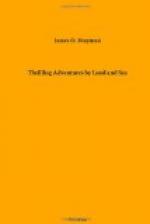Day was just breaking when Susan reached the squatter’s cabin. Having heard the sad story, Wilton and two of his sons started immediately for the spot. Nothing was to be seen save a heap of ashes. The party had apparently consisted of only three or four Indians; but a powerful tribe being in the neighborhood, they saw it would be too hazardous to follow them. From this time, Susan lived with the Wiltons. She was as a daughter to the old man, and a sister to his sons, who often said, “That, as far as they were concerned, the Indians had never done a kindlier action than in burning down Susan Cooper’s hut.”
DEAF SMITH,
The celebrated Texan spy.
About two years after the Texan revolution, a difficulty occurred between the new government and a portion of the people, which threatened the most serious consequences—even the bloodshed and horrors of civil war. Briefly, the cause was this: The constitution had fixed the city of Austin as the permanent capital, where the public archives were to be kept, with the reservation, however, of a power in the president to order their temporary removal, in case of danger from the inroads of a foreign enemy, or the force of a sudden insurrection.
Conceiving that the exceptional emergency had arrived, as the Camanches frequently committed ravages within sight of the capital itself, Houston, who then resided at Washington, on the Brazos, dispatched an order commanding his subordinate functionaries to send the state records to the latter place, which he declared to be, pro tempore, the seat of government.




